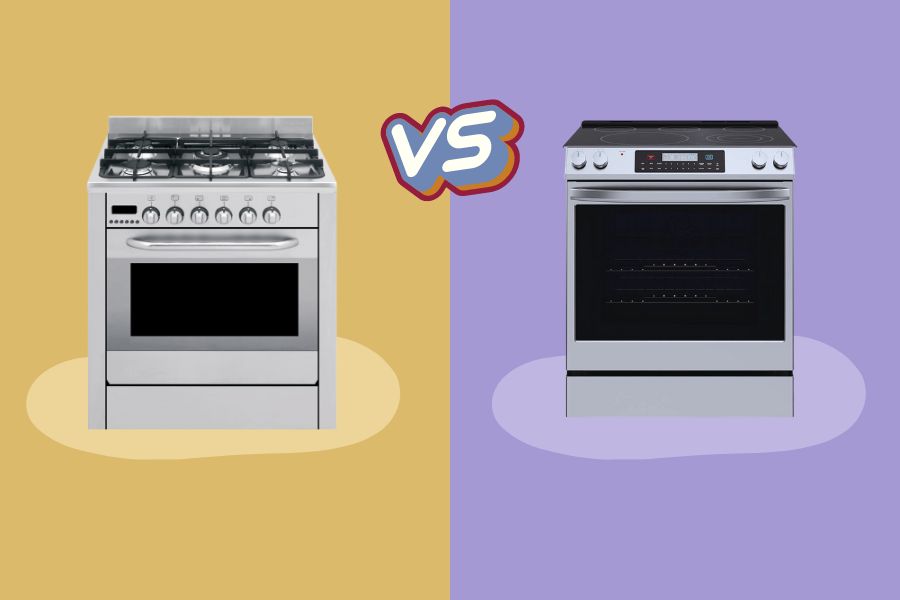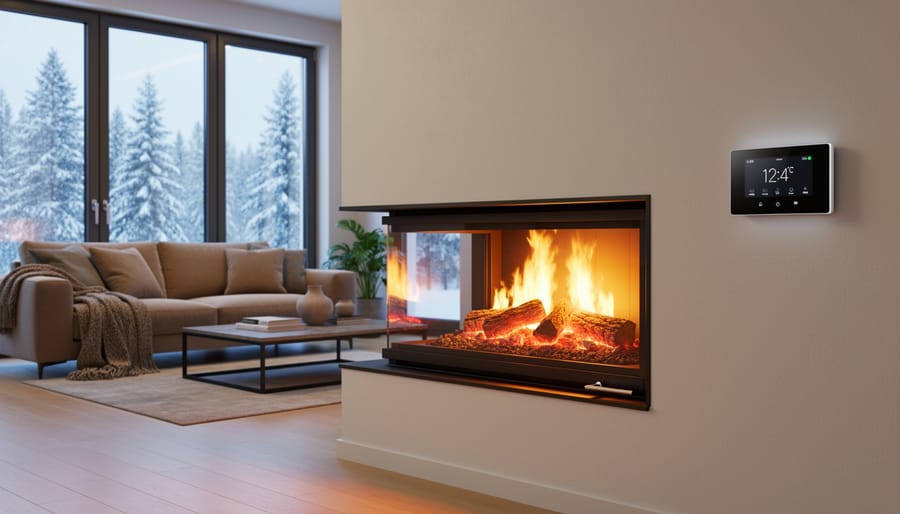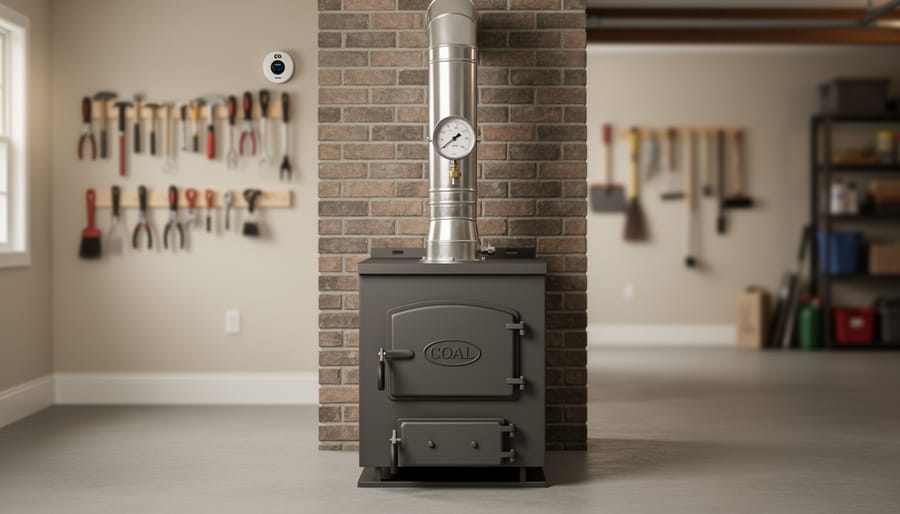Hey there! So, you’re in the market for a new stove and find yourself scratching your head, asking, “Do electric stoves use gas?” You’re not alone! With so many options—gas stoves, electric stoves, gas and electric ranges—it’s enough to make anyone’s head spin. Maybe you’re worried about the operating cost, or perhaps you’re concerned about needing to install a gas line.
I get it; the world of stoves can be overwhelming. You’ve got questions about energy efficiency, the pros and cons of each type, and maybe even safety concerns like the risk of a gas leak. Whether renovating your kitchen or dealing with a stove that’s just given up the ghost, choosing the right replacement can feel daunting.
Stick around, and we’ll sort through these questions, explore the differences between gas and electric stoves, and hopefully make your decision easier!
What Is an Electric Stove?
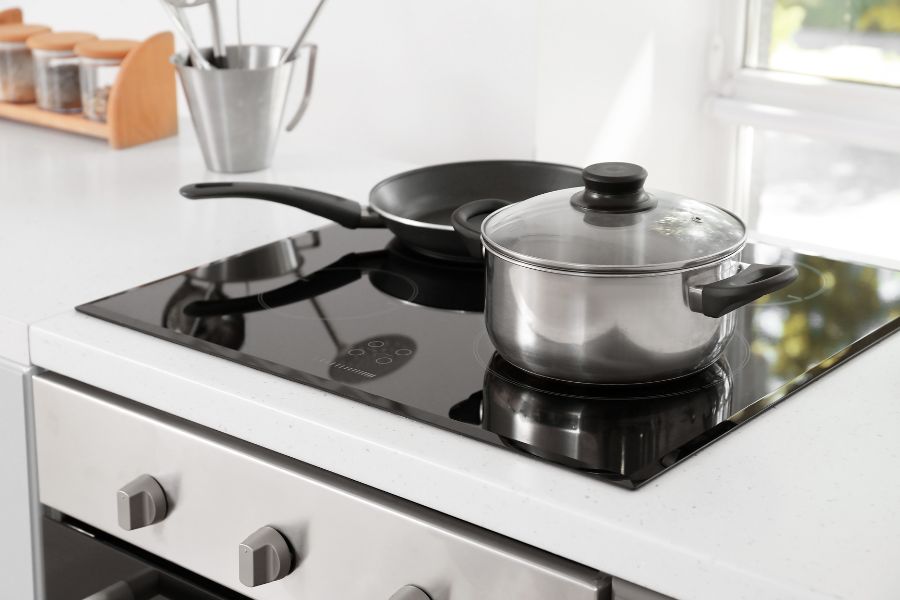
This article will examine what an electric stove is and how it works.
An electric stove is a stove that uses electricity to heat the burners. Electric stoves are powered by electricity, not gas. They can use natural gas or electricity to heat the burners. Electric stoves have been around for several years but haven’t gained much popularity since they require more power than gas stoves to run efficiently.
However, if you are interested in purchasing an electric stove instead of a regular one because you want something more efficient or environmentally friendly, then keep reading!
Do Electric Stoves Use Gas
Nope, electric stoves do not use gas. They are exclusively powered by electricity, making them distinct from gas stoves, which rely on natural gas or propane.
So now that we’ve cleared that up, let’s delve a little deeper. You might wonder why there’s confusion in the first place. Well, the world of stoves can get a bit complex. This is especially true when you throw in terms like “gas range” and “electric range” or when you see appliances labeled as “gas and electric ranges.” But when it comes down to it, electric stoves and gas stoves are two different animals.
Electric stoves use electric coils or a flat surface made of glass ceramic to heat your pots and pans. This differs from gas stoves, which use an open flame fueled by natural gas or propane. So, if you’re considering an electric stove, rest easy knowing that you won’t have to worry about installing a gas line or dealing with the operating costs of natural gas.
Choosing between a gas and an electric stove depends on your cooking needs, energy efficiency goals, and budget. Both have pros and cons; understanding these can help you make an informed decision. Stay tuned as we explore these factors further!
How Does an Electric Stove Work?
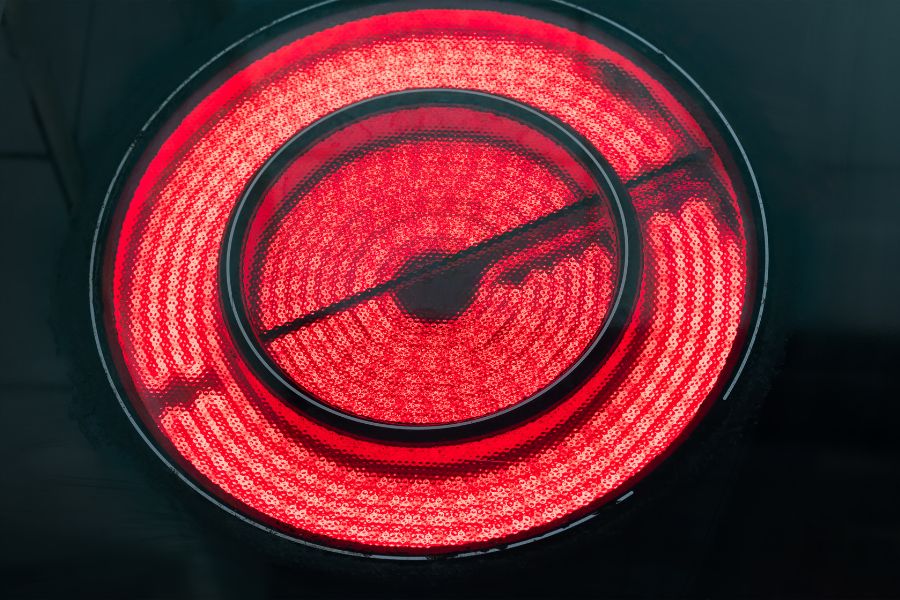
An electric stove generates heat in the burners, transferring the heat to the cookware to prepare meals.
Electric stoves are powered by electricity. Electricity is generated when an electric current flows through copper wires. This voltage creates an electromagnetic field that causes electrons to flow in one direction through the wire, creating a magnetic field around it.
This can be converted into heat using a heating element—a piece of metal such as copper or aluminum shaped into coils or loops and wrapped around poles called “elements” (hence its name). Each burner has its own element, which transfers heat from electricity into your pots and pans when you turn on your stovetop burner switch.
The heating element is connected to the burner, so when you activate that particular burner switch with your hand or remote control unit, electricity converts into heat energy within its metallic body.
The heat radiates outwards towards the bottom of any cookware placed on top of it, being heated up by those same coils inside their bases at temperatures ranging between 250°F/121°C up to 500°F/260°C depending on what type of material they are made out of.
Glass/ceramic surfaces require lower temperatures, while cast iron pans require higher ones due to their density level.
Gas Stoves Use Natural Gas, While Electric Stoves Use Electricity.
Electric stoves have a heating element that generates heat. This heat is then transferred to the cookware to prepare meals.
Gas stoves do not have a heating element in the same sense as electric stoves. Instead, they use gas to generate heat, which heats the cooking surface and thus prepares meals. Because of this difference in design, knowing what fuel your stove uses is important before purchasing one.
If you choose an electric model and don’t have access to electricity at home (or anywhere else), you won’t be able to cook with it. However, if you want an alternative fuel source for your kitchen appliance but don’t want to deal with venting issues associated with natural gas appliances (e.g., carbon monoxide poisoning), then consider converting your current models into dual-fuel models capable of operating both on electricity and liquefied petroleum gases such as propane or butane (typically found in barbecue grills).
Electric Stove or Gas Stove – Which is Better?
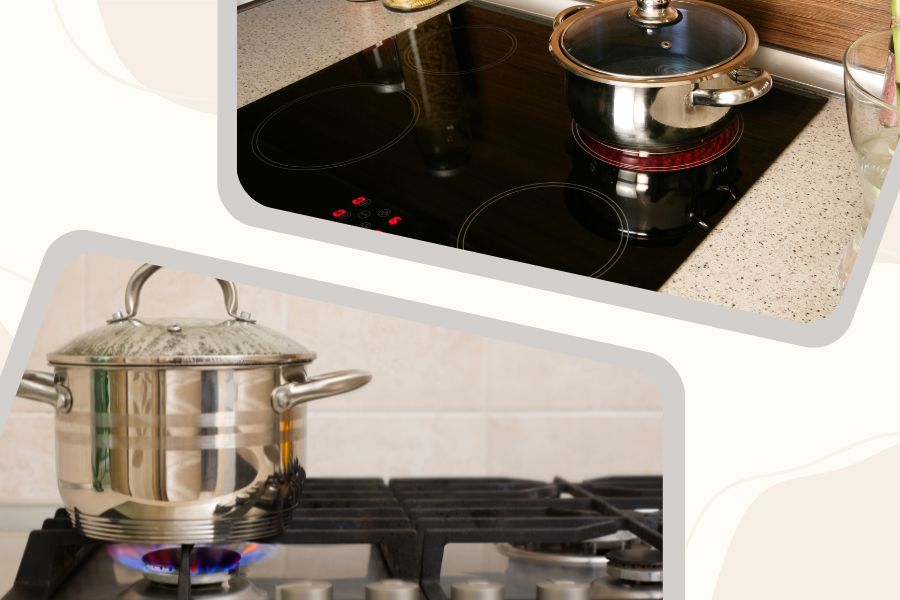
The ultimate kitchen showdown: Gas vs Electric Stoves! This hot debate leaves many cooks pondering which type of stove is right for their culinary needs. Whether it’s the responsive heat control of gas stoves or the energy efficiency of electric ranges, both have their pros and cons.
Advantages of Gas Stoves:
- Responsive Heat Control: If you’re a fan of searing meats or whipping up a quick stir-fry, the heat of gas stoves provides more immediate temperature adjustments.
- Operating Cost: Natural gas is generally cheaper than electricity, helping you keep those monthly bills down.
- Precision: Gas stoves offer faster and more precise heat, thanks to their open flame technology.
Disadvantages of Gas Stoves:
- Safety: Gas stoves use an open flame, which comes with its own set of safety concerns like the risk of a gas leak.
- Cleaning: The cast-iron grates often require removal for thorough cleaning, which can be cumbersome.
Advantages of Electric Stoves:
- Even Heat: Electric stoves offer dry heat that’s fantastic for baking and roasting. Their electric elements keep the temperature steady.
- Heat Retention: These stoves retain heat better, providing more even cooking, especially in electric ovens.
- Energy Efficiency: Electric stoves are generally considered more energy-efficient when it comes to conducting heat to your food.
Disadvantages of Electric Stoves:
- Heat Responsiveness: Electric stoves tend to have less responsive heat control than their gas counterparts.
- Electrical Requirements: These stoves require a 240-volt outlet, which could necessitate an electrical upgrade.
- Cooking Limitations: They may not be as versatile for some cooking styles like high-heat stir-frying.
So, are you team Gas or Electric? Both types of stoves offer unique benefits and drawbacks. Your final choice will depend on your individual cooking preferences and needs. Happy cooking!
Electric Stove – An Alternative Source of Energy
When there is no electricity, an alternative energy source will be needed for cooking and heating. In this case, gas stovetops can provide the heat you need.
Gas stoves rely on natural gas as their primary power source for cooking. Natural gas is a clean-burning fossil fuel used for many years in homes worldwide.
Because electric stoves have only one burner, they cannot use traditional energy sources when there is no electricity available in your home or office building. Electric stoves use propane or butane cartridges as an alternative energy source when electricity is unavailable.
However, these stoves may be more expensive than a traditional gas stovetop because they require refills more frequently than an electric range requires new batteries or plugs into its outlet (which isn’t always possible).
Are Electric Stoves More Efficient than Gas Stoves?
Here’s the million-dollar question: Which type of stove is more efficient – electric or gas? This isn’t just a gas vs electric debate; it’s a matter of energy efficiency, operating cost, and what you want from your cooking experience.
Electric stoves are generally considered more energy-efficient for a few reasons. Firstly, these stoves use electricity, not natural gas, making it easier to turn off the stove when it’s not in use. On the other hand, gas stoves often use an open flame, which can continue to consume energy unless fully extinguished. If you currently have a gas stove, you’ll know that gas stoves require a gas line, an added complexity that electric stoves sidestep.
Now, let’s talk about temperature control. Electric stoves offer precise control because they use electric elements rather than the gas burners seen in gas stoves. The heat of gas stoves can be less predictable because they use an open flame. This makes electric stoves more reliable for achieving the temperatures you need for your culinary masterpieces.
The pros and cons of each type of stove clearly show that your choice between gas and electric stoves boils down to your personal preferences and needs. While electric stoves come with a higher operating cost, they make up for it in energy efficiency. Gas stoves, on the other hand, are less expensive to operate than their electric counterparts but may pose risks such as a gas leak if not properly managed.
So, whether you’re considering buying a new stove or just curious about the differences between gas and electric ranges, the type of stove you choose will impact your recipes, energy bills, and safety. Make your choice wisely!
Gas Stoves or Electric Stoves – Which One Should I Choose?
When it comes down to it, both types of stoves can be equally efficient depending on how you use them. The one thing I would recommend you do when cooking with an electric stove is make sure that your cookware is made from non-conductive material like stainless steel or glass (glass being preferred since it heats up quickly).
This way, any excess energy won’t go into heating your pots and pans instead of going directly into cooking whatever’s inside!
Gas Stoves Heat the Air, Not the Food
A gas stove creates a flame that heats the air in your kitchen. The flame then heats the metal burners and transfers heat to your pots and pans as they sit on top. This means that you are cooking with an open flame—and you know what happens when an open flame gets close to flammable materials like cotton clothes or synthetic materials like polyester carpeting: they catch fire!
Electric stoves don’t have this safety issue because they use electricity instead of gas for cooking. An electric stove doesn’t create any flames. Instead, it uses coils inside of its heating element to heat water molecules in pots and pans placed on top until they turn into steam that cooks your food. This process is much safer than an open flame because there’s virtually zero risk of catching anything on fire (unless you leave your pot unattended for too long).
The Heat From Gas Flames Heats Food in a Pan; It Is Wasted
If you have cooked on a gas range, you know that the flame’s heat will heat up your food, and some of it will go into the air. This is not efficient!
An electric stove creates heat with electricity, which means all its energy is used for cooking whatever’s in your pan. There are two ways that this can happen:
- If there is nothing on top of an element (a bare burner), nothing will be heated because there’s no way for any heat to get out into the air around it.
- Suppose something does happen to be sitting over an element. In that case, only that object will receive energy because only its edges touch the hot surface area where heat can escape into the surrounding air or onto other objects sitting nearby.
Electric Stoves Have a Coil That Creates Heat When Electricity Flows Through Them
Electric stoves use electricity to create heat. When you turn on an electric stove, the stove’s heating element—which is often made of metal like copper or aluminum—becomes an electrical conductor.
When electricity flows through the metal, its temperature rises, creating heat. The more current flows through the metal, the hotter it gets; therefore, your cooking will be more efficient!
Benefits of Electric Stoves

The Heat Only Goes to the Air if Nothing Is on the Electric Stove
The heat only goes to the air if nothing is on the element. So, if you have a pot sitting on your electric stove, no heat will be wasted and instead be directed into heating up your food.
Electric stoves are not as efficient as gas stoves. However, they are still more than good enough for most people who don’t need something super powerful or high-powered.
Use Renewable Energy
Electric stoves can also be set up using renewable energy sources like solar, wind, and hydroelectric power. You may not have access to all these types of energy in your home. However, your electric stove may use renewable energy sources at some point in its life cycle.
Does Not Create Harmful Gasses
Electric stoves are comparatively more efficient than gas stoves. This is because they don’t produce harmful gasses or smoke when they are used. Gas stoves also pose a fire risk because they use an open flame, quickly igniting nearby flammable items like curtains or clothing.
Less Risk of Blowing Up
Another reason why electric stoves are more efficient than gas stoves is that there is no risk of an electric stove blowing up as there can be with a gas stove.
Gas stoves have a pilot light that burns continuously to ignite the burners. If this pilot light goes out or the fuel gets blocked, it can be dangerous and cause carbon monoxide poisoning. In addition, if you don’t use your gas stove properly (not turning off when done and so on), it could explode.
Electric stoves do not have these risks because they don’t use fuel. Instead, they convert energy into heat through resistance in coils or heating elements.
Distribute Heat Well
Some think electric burners do not get hot enough or distribute heat well enough to cook as effectively as gas burners. However, this is a common misconception as electric stoves can get just as hot as gas stoves (and they often do it more quickly).
Additionally, because of how electric stovetops generally work, they distribute the heat more evenly than gas burners, which helps you cook your food more evenly and efficiently.
Electric Stoves – A Better Choice Than Gas Stoves
Electric stoves use electricity. That may seem obvious, but it’s important to note that a renewable energy source powers electric stoves. While gas stoves can be dirty and not sustainable, generating the electricity needed to run your stove is cleaner than producing natural gas.
Electric stoves are also safer than their gas counterparts. They don’t have exposed heating elements or pilot lights that could cause fires or explosions if they malfunction (and sometimes even when they don’t). Since an electric stovetop has no open flame, you don’t have to worry about accidental burns from hot handles or spills catching fire from being too close to the heat source.
Conclusion
We can see that there are a lot of benefits to using electric stoves over gas stoves. They’re more efficient, use less energy, don’t produce harmful gasses or smoke, and are safer for people and the environment than traditional gas stoves.
So remember this article next time you need to replace an old stove with a new one! We hope it helps you make an informed decision when shopping for your next kitchen appliance.

